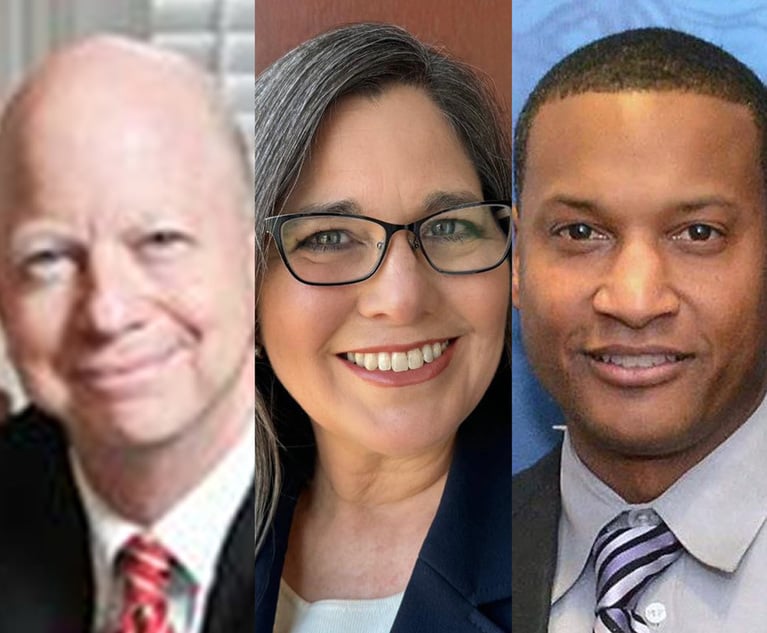 Bo Rutledge and Miles Porter (Courtesy photos)
Bo Rutledge and Miles Porter (Courtesy photos)Georgia Veteran's Case Allows U.S. High Court to Rethink Foreign Affairs Powers
Congressional foreign affairs powers have slowly waned and judicial checks been replaced by a jurisprudence of judicial deference. Recent events, however, may indicate a growing appetite for change to this equilibrium.
April 08, 2020 at 01:00 PM
6 minute read
In the decades since 9/11 and the War on Terror, congressional foreign affairs powers have slowly waned in the face of an ascendant executive. So too have judicial checks been replaced by a jurisprudence of judicial deference to the executive in the realm of foreign affairs. Recent events, however, may indicate a growing appetite for change to this equilibrium. Mutond v. Lewis offers the Supreme Court another opportunity to reexamine the allocation of authority within the system, if the justices grant certiorari.
In 2016, Darryl Lewis, a Georgia resident and military veteran, was working in the Democratic Republic of Congo as an "unarmed security advisor" to DRC presidential candidate Moise Katumbi. While traveling with a colleague, Lewis was detained and accused of being an American mercenary sent to assassinate DRC President Joseph Kabila. According to the complaint, for the ensuing six weeks, Lewis remained in custody and was subjected to daily interrogations and harsh treatment at the hands of authorities. Upon his release, Lewis filed suit in federal court against the DRC's sitting Minister of Justice and the General Director of the National Intelligence Agency as individuals, alleging liability under the Torture Victim Protection Act of 1991. The defendants moved to dismiss the suit asserting, among other defenses, official immunity.
The State Department refrained from issuing a suggestion of immunity for the officials. Lacking executive input, the district court dismissed the action for lack of subject matter jurisdiction after conducting its own analysis. Relying on Section 66(f) of the Restatement (Second) of Foreign Relations Law of the United States to determine the scope of the common law immunity, and the Supreme Court's more recent decision in Samantar v. Yousuf, the U.S. Court of Appeals for the D.C. Circuit Court reversed.
Under Samantar, it has been understood that individual foreign officials, other than heads of state and diplomats, do not qualify for immunity under the Foreign Sovereign Immunities Act of 1976. Rather the immunity granted to these officials derives from the federal common-law doctrine of foreign official immunity. Under the common-law doctrine, immunity depends on a two-step procedure. First, the State Department can issue a "suggestion of immunity" for the foreign state. Second, absent State Department recognition, courts make independent eligibility determinations.
Since Samantar, the executive has taken a broad view of its power to make immunity decisions under its foreign affairs powers. This interpretation of a near-absolute power of determination has been memorialized in various memoranda by the State Department and justified under a number of preexisting powers, principally the recognition power found in Article II of the Constitution. This current doctrine resembles the state of affairs following the Tate Letter of 1952 until Congress enacted the FSIA roughly a quarter-century later. Unfortunately, just as it did after the Tate Letter, the insertion of the executive's power into the judicial process has created confusion for the courts.
Mutond presents two questions. The first is whether the TVPA displaces portions of the common law to create an exception to the common law doctrine for jus cogens violations, following the Fourth Circuit. The second is whether suing a foreign government official in their individual capacity is compatible with the current doctrine, which immunizes individuals working in their official capacity.
As to the first issue, Lewis appears to have the stronger argument, barring contrary determinations of immunity by the executive. First, under the hierarchy of laws, "when there is such a clear conflict between statutory […] and judge-made law, the common law must give way." A contrary understanding would contravene the purpose of the law by inhibiting most actions. And to the extent a particular case carries delicate foreign-relations implications for the United States, various doctrines of case-specific deference remain available.
To the second issue, the problem is not as inflexible as it seems at first glance. Following the common-law test should result in a fact specific, case-by-case determination rather than hard rules. Also, the threat of a deluge of litigation as a result of the court permitting this distinction is overstated. Plaintiffs will be constrained by practical considerations like the solvency of their defendants. States, typically having deeper pockets, will continue to be the more attractive defendants for potential litigants.
Apart from the two issues, the case presents an opportunity for the court to opine on others. For example, does the Restatement (Second) provide the current standard governing common-law immunity (not to mention a host of other issues), given that the Restatement has undergone two subsequent revisions? Perhaps more importantly, to what extent will the court defer to State Department recommendations? As no recommendation was provided in Mutond, this issue will likely elude a definitive decision. Finally, the act of state doctrine is lurking in the background. Some commentators have asserted that the act of state doctrine in combination with status and conduct based immunities would nearly completely remove the determination of sovereign immunity from the competency of the courts, preserving it solely for the political branches. While this theory extends far beyond the historical underpinnings of the doctrine (as it does not require a court to question the validity of a foreign act), it could provide essential insight into the underlying policies that, in the current court's opinion, animate the doctrine's scope.
However the court resolves Mutond, Congress may have the last word. As experience with the FSIA demonstrated, federal legislation can help to decouple the law from politics and ensure legally predictable outcomes in the future by establishing judicially manageable standards. New legislation should address the conduct-based immunities for individuals presented in Mutond, and, at a minimum, codify the doctrine, much as the FSIA did for foreign state immunity.
Peter B. "Bo" Rutledge is dean of the University of Georgia School of Law, where he holds the Herman Talmadge Chair of Law. A former clerk to U.S. Supreme Court Justice Clarence Thomas, Rutledge pursues teaching and research of international dispute resolution, arbitration, international business transactions and the U.S. Supreme Court.
Miles S. Porter is a second-year law student at the University of Georgia School of Law and a recipient of the Talmadge Law Scholarship and the Veterans Scholarship.
This content has been archived. It is available through our partners, LexisNexis® and Bloomberg Law.
To view this content, please continue to their sites.
Not a Lexis Subscriber?
Subscribe Now
Not a Bloomberg Law Subscriber?
Subscribe Now
NOT FOR REPRINT
© 2024 ALM Global, LLC, All Rights Reserved. Request academic re-use from www.copyright.com. All other uses, submit a request to [email protected]. For more information visit Asset & Logo Licensing.
You Might Like
View All

Who Got the Work: 16 Lawyers Appointed to BioLab Class Action Litigation
4 minute read

'Possible Harm'?: Winston & Strawn Will Appeal Unfavorable Ruling in NASCAR Antitrust Lawsuit
3 minute readTrending Stories
- 1Haynes Boone, Hicks Thomas Get Dismissal of $1.3B Claims in 2022 Freeport LNG Terminal Explosion
- 2Immigration Under the Trump Administration: Five Things to Expect in the First 90 Days
- 3'Radical Left Judges'?: Trump Demands GOP Unity Against Biden's Judicial Picks
- 4NY District Attorneys Are Still No Fans of Revamped Misconduct Watchdog
- 5ICC Issues Arrest Warrants for Israel's Prime Minister Over Alleged War Crimes in Gaza
Who Got The Work
Michael G. Bongiorno, Andrew Scott Dulberg and Elizabeth E. Driscoll from Wilmer Cutler Pickering Hale and Dorr have stepped in to represent Symbotic Inc., an A.I.-enabled technology platform that focuses on increasing supply chain efficiency, and other defendants in a pending shareholder derivative lawsuit. The case, filed Oct. 2 in Massachusetts District Court by the Brown Law Firm on behalf of Stephen Austen, accuses certain officers and directors of misleading investors in regard to Symbotic's potential for margin growth by failing to disclose that the company was not equipped to timely deploy its systems or manage expenses through project delays. The case, assigned to U.S. District Judge Nathaniel M. Gorton, is 1:24-cv-12522, Austen v. Cohen et al.
Who Got The Work
Edmund Polubinski and Marie Killmond of Davis Polk & Wardwell have entered appearances for data platform software development company MongoDB and other defendants in a pending shareholder derivative lawsuit. The action, filed Oct. 7 in New York Southern District Court by the Brown Law Firm, accuses the company's directors and/or officers of falsely expressing confidence in the company’s restructuring of its sales incentive plan and downplaying the severity of decreases in its upfront commitments. The case is 1:24-cv-07594, Roy v. Ittycheria et al.
Who Got The Work
Amy O. Bruchs and Kurt F. Ellison of Michael Best & Friedrich have entered appearances for Epic Systems Corp. in a pending employment discrimination lawsuit. The suit was filed Sept. 7 in Wisconsin Western District Court by Levine Eisberner LLC and Siri & Glimstad on behalf of a project manager who claims that he was wrongfully terminated after applying for a religious exemption to the defendant's COVID-19 vaccine mandate. The case, assigned to U.S. Magistrate Judge Anita Marie Boor, is 3:24-cv-00630, Secker, Nathan v. Epic Systems Corporation.
Who Got The Work
David X. Sullivan, Thomas J. Finn and Gregory A. Hall from McCarter & English have entered appearances for Sunrun Installation Services in a pending civil rights lawsuit. The complaint was filed Sept. 4 in Connecticut District Court by attorney Robert M. Berke on behalf of former employee George Edward Steins, who was arrested and charged with employing an unregistered home improvement salesperson. The complaint alleges that had Sunrun informed the Connecticut Department of Consumer Protection that the plaintiff's employment had ended in 2017 and that he no longer held Sunrun's home improvement contractor license, he would not have been hit with charges, which were dismissed in May 2024. The case, assigned to U.S. District Judge Jeffrey A. Meyer, is 3:24-cv-01423, Steins v. Sunrun, Inc. et al.
Who Got The Work
Greenberg Traurig shareholder Joshua L. Raskin has entered an appearance for boohoo.com UK Ltd. in a pending patent infringement lawsuit. The suit, filed Sept. 3 in Texas Eastern District Court by Rozier Hardt McDonough on behalf of Alto Dynamics, asserts five patents related to an online shopping platform. The case, assigned to U.S. District Judge Rodney Gilstrap, is 2:24-cv-00719, Alto Dynamics, LLC v. boohoo.com UK Limited.
Featured Firms
Law Offices of Gary Martin Hays & Associates, P.C.
(470) 294-1674
Law Offices of Mark E. Salomone
(857) 444-6468
Smith & Hassler
(713) 739-1250






